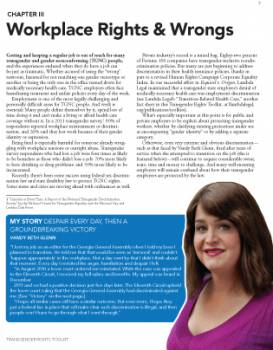
Workplace Rights & Wrongs
Getting and keeping a regular job is out of reach for many transgender and gender-nonconforming (TGNC) people, and sometimes steady employment is no better: Whether accused of using the “wrong” bathroom, harassed for not matching one gender stereotype or another, or being the only one in the offi ce turned down for medically necessarily health care, TGNC employees often endure humiliating treatment and unfair policies every day of the week.
Employment is one of the most legally challenging and personally diffi cult areas for TGNC people. And work is essential: Many people define themselves by it, spend lots of time doing it, and can’t make a living or find health care coverage without it. In a 2011 transgender survey,1 90% reported workplace mistreatment or discrimination, and 26% said they lost work because of their gender identity or expression.
Being fired may be the last straw for someone already struggling with workplace tensions or outright abuse. Transgender survey respondents who had lost a job because of anti-trans bias were four times as likely to be homeless as those who didn’t lose a job; 70% more likely to have drinking or drug problems; and 50% more likely to be incarcerated.

